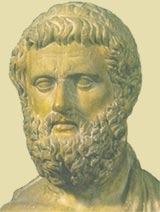 |
| Solon of Athens (http://www.sikyon.com/athens/ images/solon.jpg) |
Solon (630-560 BC) was born into wealth and privilege and was appointed as a political figure of Athens and was one of Athens outstanding lawmakers. Solon was a fair and moderate man and he instituted many political reforms including social and economic, constitutional, moral as well as sexual reforms. Solon was an antecedent to Plato and brought back the story of Atlantis from the ancient Egyptians, which he handed down to Plato. (Atlantis was said to have existed 9000 years before Plato approximately 9827 BC!) Plato based his Critias and Timaeus on this ancient fabled city.
Solon's constitutional reforms appear to have established the foundation of a true democracy. Before Solon, Greece's political structure was of an oligarchy. There was a political assembly of the aristocratic class and noble land owners. However, the lowest class was not allowed to be part of this assembly. According to Aristotle, Solon legislated for all citizens to be admitted to the assembly by broadening the financial and social qualifications required for election to public office. He thereby made it possible for persons of less noble birth to gain office by allowing them the opportunity to own land.
One of the greatest reforms Solon made was social and economic in nature. He sought to help the poor of Athens by abolishing the institution of hektemorage, which was the giving of one-sixth of the farmers produce to the "few" or "the rich" to whom they were in some case indebted. Heketemorge was originally, a contractual voluntary arrangement whereby the small man gave his labor to the great man of the area, forfeiting a sixth of his produce and symbolically recognizing his subordination. The small man was then provided protection from the great land owners. (The root word "hekat" comes from the ancient Egyptian measure which employed the Eye of Horus in fractional measurements and was divided into six fractions.) Solon, through legislation and reform, went as far as to bring back indentured servants from abroad who were sold into slavery for their debts. Some languished so long in foreign countries they no longer spoke their native language. Solon's moral reforms sought to restrain the greed and arrogance of its citizens. The visible symbol of this arrogance and greed was in the horos, a wooden stone or pillar, indicating that a farmer was in debt or under contractual obligation to someone else through heketemorage. Before Solon, land was the inalienable property of a family or clan. Not a problem for large land owners, however a farming family struggling with a small piece of rented land could not use the land for security on a loan. Families with large land holdings could rent out farms in a process known as sharecropping. As a result, a farmers who rented land would have to give himself or his family as security on a loan, which would provide a contract for indenture.
His economic reforms sought to establish opportunities for trade within their own country and abroad. Since, trade opportunities were limited, Solon fostered production of olive oil, a cash crop. He restricted all other agricultural exports. He changed Athenian weights and measures, and perhaps coins, to conform to the most common Greek standard. As a result, there was a commercial boom and the economy prospered.
Solon also advocated women's rights to own property. Before Solon a woman who was the sole heir to her father's property could not own it unless she married her nearest paternal relative in order to produce an heir to her father's estate. Solon sought legislative reform to reduce the abuses towards women within the system. Solon fostered Athens' future personal modesty and the frugality of the rich and powerful men in Athens' subsequent golden age.
These injustices were born out of the archaic and increasingly inefficient system of land tenure. It was also associated with various forms of immoral extravagance and criminal injustice. Solon's legislation sought to reform these moral injustices by annulment of all contracts symbolized by the horoi, the prohibition of using a person as security on a loan, release of all Athenians who had been enslaved as indentured servants, entitlement of any citizen to take legal action on behalf of another, and abolition of extravagant dowries. Later in Athenian history, this legislation became celebrated as Seisachtheia or the "shaking off of burdens." Solon's legislation not only removed slavery and accumulated debt, it also removed the ordinary farmers' only means of obtaining further credit.
Page created on 2/28/2008 12:00:00 AM
Last edited 2/28/2008 12:00:00 AM
